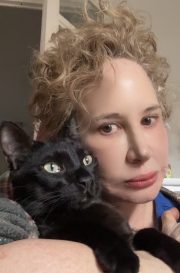Subject: Hello from your Publicist
by Gabrielle Gantz
 If the title of this post caught your eye, chances are you’ve sold a book to a publishing house and are now in the process of moving forward to publication date. Maybe you’re on your second or third novel and are looking for tips for the next time around. Whatever your interest may be, I hope to shed some light on what a book publicist does and how you, as an author, can play an active role in your book’s campaign.
If the title of this post caught your eye, chances are you’ve sold a book to a publishing house and are now in the process of moving forward to publication date. Maybe you’re on your second or third novel and are looking for tips for the next time around. Whatever your interest may be, I hope to shed some light on what a book publicist does and how you, as an author, can play an active role in your book’s campaign.
Many editors will have a general form called an “Author Questionnaire.” It contains questions regarding your personal information: where you live, where you can be reached, your biographical information for press materials, etc. It will also ask for a description of your book in your own words, what published, or soon-to-be-published, book you believe yours resembles, a list of previous media appearances or lectures you’ve given, and anyone influential, who you know personally, who should receive a complimentary copy.
If you haven’t received something like this, ask your editor if they have one. If they don’t, by the end of this piece you’ll have enough information to create your own.
WHAT IS PUBLICITY?
Basically, publicity is everything that can be obtained for free:
- reviews in trade publications, magazines, newspapers, and on websites
- interviews with local and national radio and appearances on local and national television
- placement of op-eds
- and, although travel and lodging are not free, bookstore events are arranged at no cost to the publisher
THE PUBLICITY TIMELINE
Publicists work on a timeline. We often begin 4 to 5 months ahead of the on-sale date starting with an advance copy mailing to “long lead” magazines, trade publications, book review editors at major newspapers, national radio producers, heavily-trafficked websites, and, if your book fits the audience, national television producers.
When you hear “long lead” you should think “glossy” and “monthly.” These outlets plan their content about 3 to 4 months ahead of time. Trade publications such as Publishers Weekly, Library Journal, and Kirkus give booksellers, librarians, reviewers, and producers a sneak preview of what books are coming down the pike.
From the advance copy mailing you’ll know if magazines plan to run reviews and possibly if a national show is interested in an interview. As for the daily papers and websites, it will be too early to hear from them—their advance copy acts as a “heads up” until the final version is available.
The finished copies of your books go out approximately 6 weeks ahead of publication date. While monthly magazines have already planned their coverage for the issue hitting the newsstands when your book goes on sale, increasingly publicists are sending finished copies for online consideration if a print review had not been scheduled.
Finished copy mailings are larger in number and wider in scope. On the list are the same book review editors, television and radio producers, and major websites who received an advance copy. Added to the list are smaller papers, your local media, a few larger alternative weeklies, and book bloggers.
If you’re one of the few lucky authors to go on tour, your publicist will put together a media list of newspapers, radio shows, and possibly television programs in the markets where you have your events.
Most publishing houses now post electronic galleys to Netgalley, a free service for media professionals, bloggers, and book sellers. This gives your book a wider reviewing audience. You should ask your publicist if they’ve made your book available. If not, push for them to do so.
MEETING WITH YOUR PUBLICIST
Today, when the dominant form of communication is email, it’s easy to go through your publicity campaign without ever hearing your publicist’s voice. This would be a mistake. For the most part email is great. It’s quick, can be done multiple times a day without feeling intrusive, and having a full conversation in one place is convenient for referring back to what it is you need to do. However, to begin the process you should schedule a time about 5 months before your book goes on sale to discuss the plan. If you’re in the same city as your publicist you should consider meeting in person for a quick, 20 to 30-minute chat either in their office or over coffee at a nearby cafe.
One of the best reasons to speak with your publicist by phone or face-to-face is to brainstorm for “talking points,” one or two sentence soundbites that might grab the interest of an interviewer. While fiction can be a hard sell to radio and television producers, if you have a unique backstory or if your book lends itself to the discussion of nonfiction topics it might help to pique their interest. In the initial meeting with your publicist you should discuss not-so-obvious aspects about yourself and your book: why you wrote it, real-world themes it touches on, and your day job if it’s unusual.
Two examples of books with interesting stories behind them have been Justin Cronin’s The Passage, which began as a writing exercise between him and his young daughter and Neil Gaiman’s Coraline, which was largely written so his daughter would have a gothic tale with a heroine protagonist. Authors whose careers offer extra material are Daniel H. Wilson, author of Robopocalypse, who is a robotics engineer and Lev Grossman, author most recently of The Magician King, who is a book critic for TIME magazine.
If you’re unfamiliar with the author interview, you should start listening to podcasts within your genre. If you’re a science fiction and fantasy writer The Geek’s Guide to the Galaxy, SF Signal, and The Functional Nerds are fantastic. For a more general idea, WNYC’s Leonard Lopate Show and NPR’s Fresh Air both conduct great author interviews. Conversely, if you’ve been on radio and television in the past and have clips, preferably links to an online archive, you should send them to your publicist, leaving out any interviews you feel went horribly wrong.
MEDIA LIST
While most publishing houses have a great database of publications, if you’re steeped in the genre in which you write, you can create a list of your own. This can be as simple as listing niche publications and specific reviewers or as in-depth as including personal industry contacts and their home addresses. No fear, if you only know the name of the publication your publicist will be able to find the correct contact person and their mailing address.
Since this is the Science Fiction & Fantasy Writers of American website, I’ll speak specifically to genre fiction. If you’re publishing with Ace, Roc, DAW, Tor, Harper Voyager, Angry Robot, Solaris, or Orbit, it’s safe to assume they know about Locus Magazine and other similar publication. However, now that more general fiction imprints are picking up science fiction, fantasy, and horror titles, and although it’s the job of the publicist to hunt and peck for every available outlet, it couldn’t hurt to lend some of your insight—even if it’s only to set your mind at ease.
Keeping in mind the timeline above, make a list of outlets and reviewers you know of marking off those you feel are “long lead” publications. If you know the contact personally, note that as well. Not everyone will need an advance copy but those who do should be noted. Before sending your list, find out how your publicist wants the information. Is a Word document okay or do they have a standardized Excel grid?
EVENTS
As you may already know, publishers are sending fewer authors on tour—and for good reason. Turnout tends to be low for lesser-known writers and, as mentioned above, media’s interest in fiction is finicky. While some bookstores do wind up with a nice audience, numbers in the teens are not unheard of. What can be done, however, is a local reading either at a bookstore, library, or some other event space that’s known for hosting authors. If you have a preferred store or if you know of a reading series in your area, add it to your list. Most publicity departments receive requests from venues but author input is often considered when making a decision.
Another thing to keep in mind about events is if you’re traveling or visiting family around the publication date. This doesn’t mean you’ll be on vacation; in fact, check with your publicist before making plans two weeks before and after your book goes on sale, they’ll need you to be readily available in case last minute media comes through. While most publishing houses can’t pay for unplanned transportation and lodging, if you have friends and family in a location with a strong bookstore, it’s worth mentioning if you’re willing to pay your own way and stay with someone. Your publicist can check in with the bookstore to see if there’s interest in hosting a reading. Keep in mind that many bookstores plan their events 3 to 4 months ahead of time so mention this early.
SOCIAL MEDIA
Right now some of you are rolling your eyes, some of you are patting yourselves on your back for your 2k+ fans and followers, and others think I want you to do all the work. Well, stop the eye rolling, congrats on your followers, and I assure you, I am working hard on my end. Now that that’s out of the way, let’s talk social media.
First off, it’s not for everyone. If you’ve attempted to tweet in the past and it’s derailed your writing, please, tell your editor and publicist. We would much rather have you write books than rack up hours of Tweets. However, everyone should have some online presence, even if it’s just a simple website where you can list your book(s).
There are a few free blog hosting sites where you can create one for yourself quickly and easily. You can also buy a domain name for as little as $12 a year. A specialized domain name makes it easier for potential and existing fans to locate you. Syncing the domain name with your website account is fairly easy for tech-savvy people but someone at the publishing house—or a blogger friend—will be able to help you if you’re not sure how to do this.
If you don’t have a website yet, or if yours has been neglected, you should look to other authors for ideas. Search for sites both within your genre and outside of it. What’s effective? What’s confusing? What looks good and what looks terrible? Learn from other people’s successes and failures. Your website should be easy to navigate, up-to-date, and have an about page with your current biography. There should be a contact page with your publicist’s information so reviewers and interviewers can get in touch with them directly for a complimentary copy or to schedule an interview. You should ask your publicist for official “contact information language.”
Links to your social media accounts should be visible on your homepage. If you have a blog and your last entry is from 2010 take it down or start posting again—no need for an apology or an explanation, just get back to it. Posting once or twice a month is sufficient, it just needs to be current.
Twitter and Facebook can be instrumental in getting news out about your new book: you can post links to interviews and positive reviews; you can let people know about upcoming appearances, etc. If you maintain a blog or website, it’s a good way to bring in additional traffic.
One can write a whole book on, or devote an entire website to, tips for using social media — and many have. Unfortunately, space here doesn’t allow for all you need to know but if you’re a keen observer, you’ll pick up most of it just by participating. The most important rule for now is: don’t spam people about your book.
Here are a few tips to get you started if you’re not an active user already:
- Building an audience can take time and the sooner you start, the better
- Most people who have a large fan base rarely use their platform for blatant self-promotion—learn from them
- Make a list of what interests you: what you do when you’re not writing; what websites, magazines, and newspapers you read; what radio programs you listen to; do you like art? music? animals? do you take photos? These are some non-book related subjects you can blog about or share on Twitter and Facebook that will make you more interesting to follow than if you just talked about your own writing
- When creating a bio on social media platforms, include the name of your forthcoming book — and your past books if you have any — but also add something entirely unrelated to your writing life. For example, John Scalzi has “I enjoy pie.” It doesn’t need to be humorous, sincere works as well
OFF THE BOOK PAGE
If you’ve been poking around on the Internet lately, you may have noticed a few websites that offer original content from authors. Although your book is finished your writing days may not be. There are many websites that want original essays from you; some may ask for a few lines of text to go along with a slideshow relevant to the content of your book; book bloggers often conduct email interviews; and the popular website Largehearted Boy is well-known for the segment called “Book Notes” where authors create a hypothetical playlist of the music that came to mind while they were writing. Unfortunately, these will not be paid pieces but they will help promote the sale of your book by getting your name and the title into people’s minds.
The publishing industry has increased the number of books they publish, newspapers are cutting staff, which means fewer reviews, and readers are getting their information from multiple sources. The online world is thriving and it would be beneficial to take advantage of every opportunity presented to you.
One of the most frequently asked questions from authors is “is it worth it?” The answer is almost always yes, especially if you are just starting out in your writing career. If something is not worth your time, most publicists will mention this when they send along the inquiry. Unless you are a well-established author whose books hit the New York Times Bestseller list simply by being published, almost everything is worth doing.
FREELANCE PUBLICISTS
In-house publicists work with freelancers all the time. Have no fear, we will not be offended if you want to hire extra hands. We can even recommend a specific person or company who we feel has done good work in the past and who will be a good fit for what you need. We can also give you input into what package would make the most sense so you can make an informed decision.
IN CONCLUSION
Think of your publicity campaign as a marathon: a lot of training leading up to the big day and a few hours, figuratively speaking, of the actual race. The lesson: start early.
•••
Gabrielle Gantz is a Publicist with Viking and Penguin. When she’s not reading, or forcing others to, she’s listening to an inordinate amount of podcasts, taking pictures of weird things that cross her path, and drinking obscene amounts of coffee. She writes about arts & culture over at The Contextual Life and can be found on Twitter at @contextual_life.


